2018 UCI Road World Championships – Men's under-23 road race
The Men's under-23 road race of the 2018 UCI Road World Championships was a cycling event that took place on 28 September 2018 in Innsbruck, Austria. It was the 23rd edition of the event, for which French rider Benoît Cosnefroy was the defending champion, having won in 2017.[2] 178 riders from 52 nations entered the competition.[3]
| 2018 UCI Road World Championships | ||||||||||
|---|---|---|---|---|---|---|---|---|---|---|
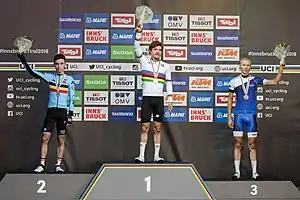 The final podium (from left to right): Bjorg Lambrecht (Belgium), Marc Hirschi (Switzerland) and Jaakko Hänninen (Finland). | ||||||||||
| Race details | ||||||||||
| Dates | 28 September 2018 | |||||||||
| Stages | 1 | |||||||||
| Distance | 179.5 km (111.5 mi) | |||||||||
| Winning time | 4h 24' 05"[1] | |||||||||
| Medalists | ||||||||||
| ||||||||||
| Events at the 2018 UCI Road World Championships | ||
|---|---|---|
_pictogram.svg.png.webp) | ||
| Participating nations Qualification | ||
| Elite events | ||
| Elite road race | men | women |
| Elite time trial | men | women |
| Elite team time trial | men | women |
| Under-23 events | ||
| Under-23 road race | men | |
| Under-23 time trial | men | |
| Junior events | ||
| Junior road race | men | women |
| Junior time trial | men | women |
The race was won by Switzerland's Marc Hirschi – becoming the first Swiss rider to win the gold medal[4] – after he attacked from a small group on the final descent into Innsbruck, and soloed away to a fifteen-second margin of victory.[5] The remaining members of that small group, Bjorg Lambrecht from Belgium and Finland's Jaakko Hänninen, did battle for the remaining medals, with silver going to Lambrecht and bronze to Hänninen.[6]
Course
The race started in Kufstein and headed south-west towards Innsbruck with a primarily rolling route, except for a climb of 5 kilometres (3.1 miles) between Fritzens and Gnadenwald – as had been in the time trial events earlier in the week – with an average 7.1% gradient and maximum of 14% in places.[7] After 84.2 kilometres (52.3 miles), the riders crossed the finish line for the first time, before starting four laps of a circuit 23.8 kilometres (14.8 miles) in length. The circuit contained a climb of 7.9 kilometres (4.9 miles), at an average gradient of 5.9% but reaching 10% in places, from the outskirts of Innsbruck through Aldrans and Lans towards Igls.[8] After a short period of flat roads, the race descended through Igls back towards Innsbruck and the finish line in front of the Tyrolean State Theatre.
Qualification
Qualification was based mainly on the UCI Under-23 Continental Rankings by nations as of 12 August 2018, with varying number on qualifications depending on the continent.[9] In addition to this number,[9] any rider within the top placings of the continent's elite tour ranking that was not already qualified, the outgoing World Champion and the current continental champions were also able to take part.[10]
Qualification methods
The following nations qualified.[10]
| Tour | Criterium | Rank | No. of riders to start |
Nations |
|---|---|---|---|---|
| UCI Africa Tour | Under-23 Ranking by Nations | 1st | 5 | |
| 2nd | 4 | |||
| 3–5 | 3 | |||
| UCI America Tour | 1–3 | 5 | ||
| 4–6 | 4 | |||
| 7–10 | 3 | |||
| UCI Asia Tour | 1–2 | 5 | ||
| 3–4 | 4 | |||
| 5–7 | 3 | |||
| UCI Europe Tour | 1–15 | 5 | ||
| 16–20 | 4 | |||
| 21–27 | 3 | |||
| UCI Oceania Tour | 1st | 5 | ||
| 2nd | 3 |
Continental champions
| Name | Country | Reason |
|---|---|---|
| Masaki Yamamoto | Asian Champion | |
| Marc Hirschi | European Champion | |
| Federico Vivas | Pan American Champion |
Participating nations
178 cyclists from 52 nations were entered in the men's road race.[3] The number of cyclists per nation is shown in parentheses.[1]
.svg.png.webp) Australia (5)
Australia (5) Austria (4)
Austria (4) Azerbaijan (2)
Azerbaijan (2).svg.png.webp) Belgium (5)
Belgium (5)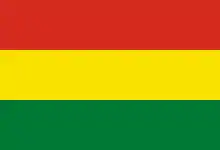 Bolivia (2)
Bolivia (2) Brazil (1)
Brazil (1)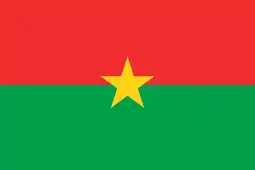 Burkina Faso (1)
Burkina Faso (1).svg.png.webp) Canada (4)
Canada (4) Chile (3)
Chile (3) Colombia (5)
Colombia (5)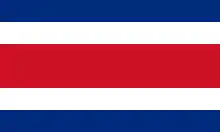 Costa Rica (1)
Costa Rica (1) Croatia (4)
Croatia (4)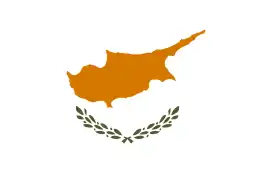 Cyprus (1)
Cyprus (1) Czech Republic (3)
Czech Republic (3) Denmark (5)
Denmark (5)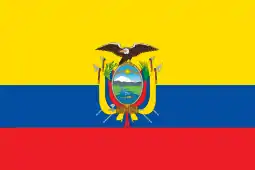 Ecuador (5)
Ecuador (5)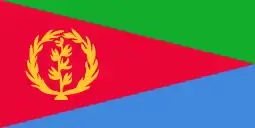 Eritrea (3)
Eritrea (3)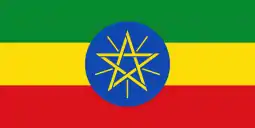 Ethiopia (1)
Ethiopia (1) Finland (1)
Finland (1) France (6)
France (6) Germany (6)
Germany (6) Great Britain (5)
Great Britain (5)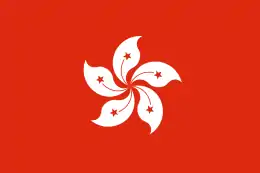 Hong Kong (3)
Hong Kong (3) Hungary (3)
Hungary (3) Ireland (5)
Ireland (5) Israel (1)
Israel (1) Italy (6)
Italy (6) Japan (5)
Japan (5)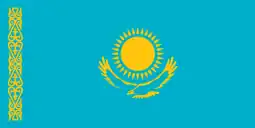 Kazakhstan (3)
Kazakhstan (3) Luxembourg (4)
Luxembourg (4) North Macedonia (1)
North Macedonia (1) Mexico (3)
Mexico (3)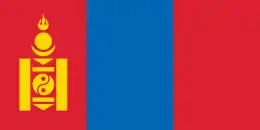 Mongolia (2)
Mongolia (2)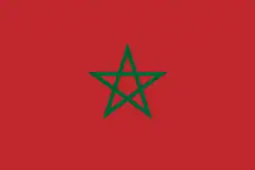 Morocco (2)
Morocco (2) Netherlands (5)
Netherlands (5) New Zealand (3)
New Zealand (3) Norway (5)
Norway (5) Poland (5)
Poland (5) Portugal (4)
Portugal (4) Romania (2)
Romania (2) Russia (4)
Russia (4)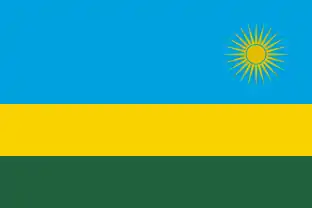 Rwanda (5)
Rwanda (5) Serbia (2)
Serbia (2) Slovakia (1)
Slovakia (1) Slovenia (6)
Slovenia (6) South Africa (2)
South Africa (2) Spain (5)
Spain (5) Sweden (3)
Sweden (3)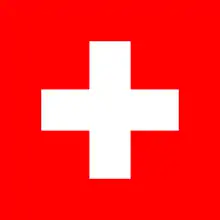 Switzerland (6)
Switzerland (6)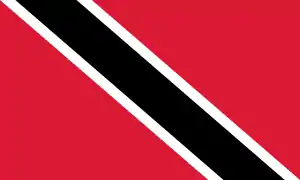 Trinidad and Tobago (1)
Trinidad and Tobago (1) Ukraine (3)
Ukraine (3) United States (5)
United States (5)
Final classification
Of the race's 178 entrants, 90 riders completed the full distance of 179.5 kilometres (111.5 miles).[1]
|
|
References
- "Final Results / Résultat final: Men Under 23 Individual Road Race / Course en ligne Hommes U23" (PDF). Sport Result. Tissot Timing. 28 September 2018. Retrieved 30 September 2018.
- Wynn, Nigel (22 September 2017). "Frenchman Benoît Cosnefroy wins under-23 men's road race world title; Brit Wood fourth". Cycling Weekly. TI Media. Retrieved 30 September 2018.
- "Start List / Liste de départ: Men Under 23 Road Race / Course en ligne Hommes U23" (PDF). Sport Result. Tissot Timing. 27 September 2018. Retrieved 30 September 2018.
- MacLeary, John (28 September 2018). "Marc Hirschi becomes first Swiss to win under-23 men's road race at UCI Road World Championships after late attack". The Daily Telegraph. Telegraph Media Group. Retrieved 30 September 2018.
- Ballinger, Alex (28 September 2018). "Marc Hirschi wins U23 World Championship after tactical Swiss performance". Cycling Weekly. TI Media. Retrieved 30 September 2018.
- Ryan, Barry (28 September 2018). "Hirschi wins under-23 road race". Cyclingnews.com. Immediate Media Company. Retrieved 30 September 2018.
- "Rohan Dennis beats Dumoulin for world time trial title". New Jersey Herald. Keith Flynn, Quincy Media. 26 September 2018. Archived from the original on 27 September 2018. Retrieved 30 September 2018.
The course through the Austrian Alps was rather flat for the first 30 kilometers, until a five-kilometer climb from Fritzens to Gnadenwald with an average gradient of 7.1 percent.
- "2018 UCI Road World Championships - Technical guide" (PDF). UCI.ch. Union Cycliste Internationale. p. 57. Retrieved 30 September 2018.
- "Qualification system for the 2018 UCI Road World Championships" (PDF). UCI.ch. Union Cycliste Internationale. 16 August 2018. pp. 3–4. Retrieved 30 September 2018.
- "Nations and quotas of athletes revealed for Innsbruck-Tirol, Austria" (PDF). Union Cycliste Internationale. Deltatre. 16 August 2018. pp. 4–5. Archived from the original (PDF) on 26 September 2018. Retrieved 30 September 2018.